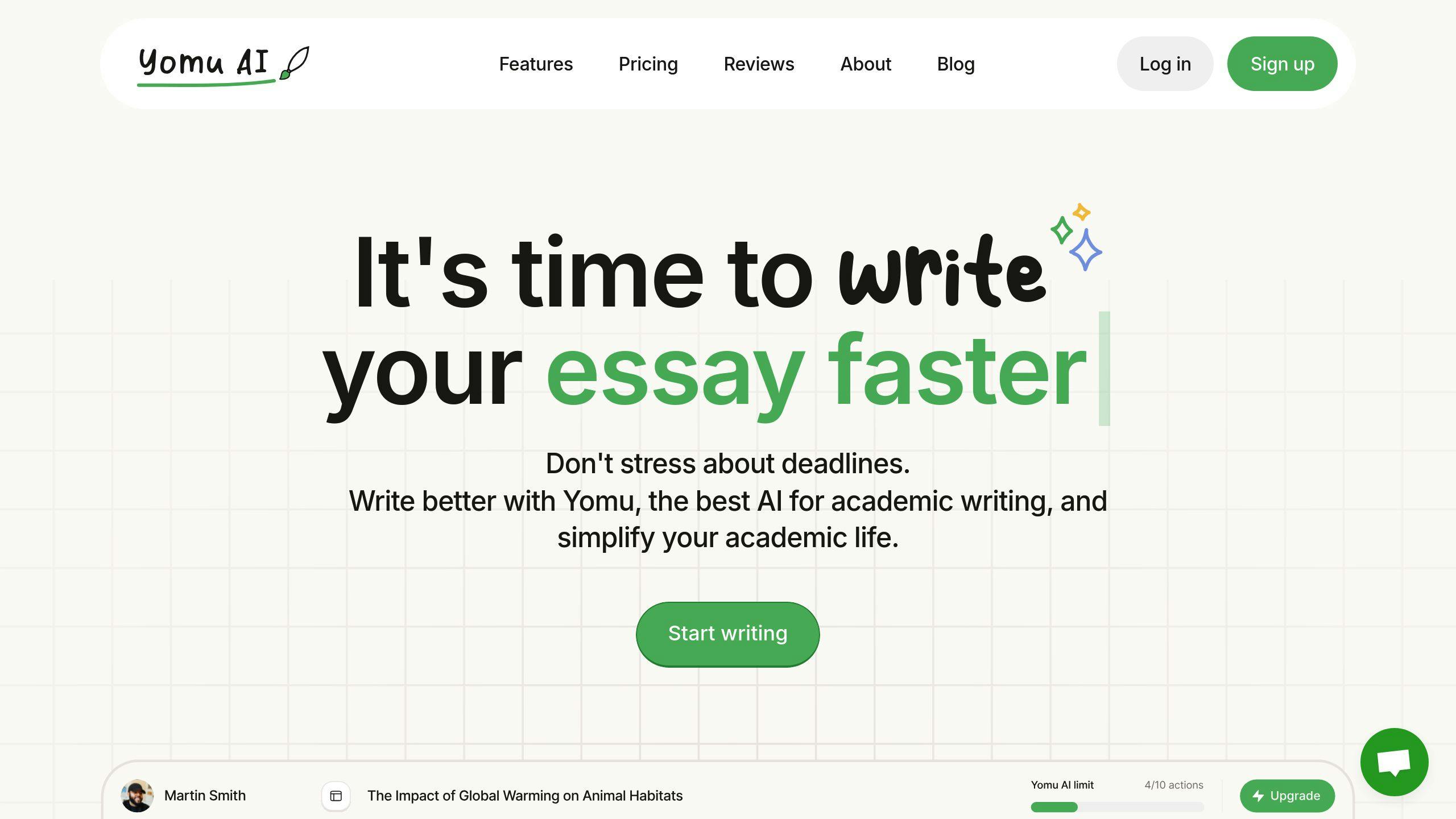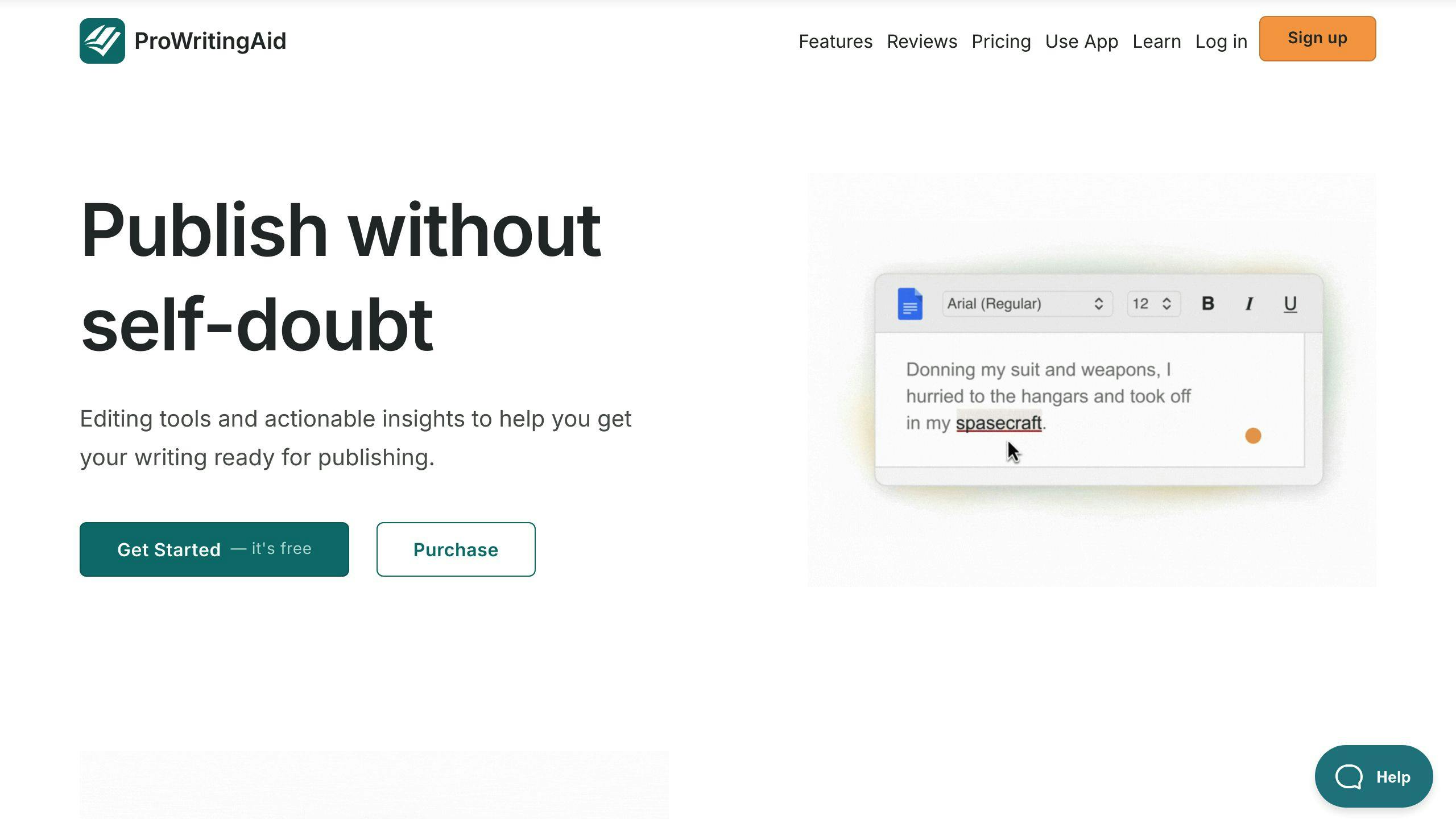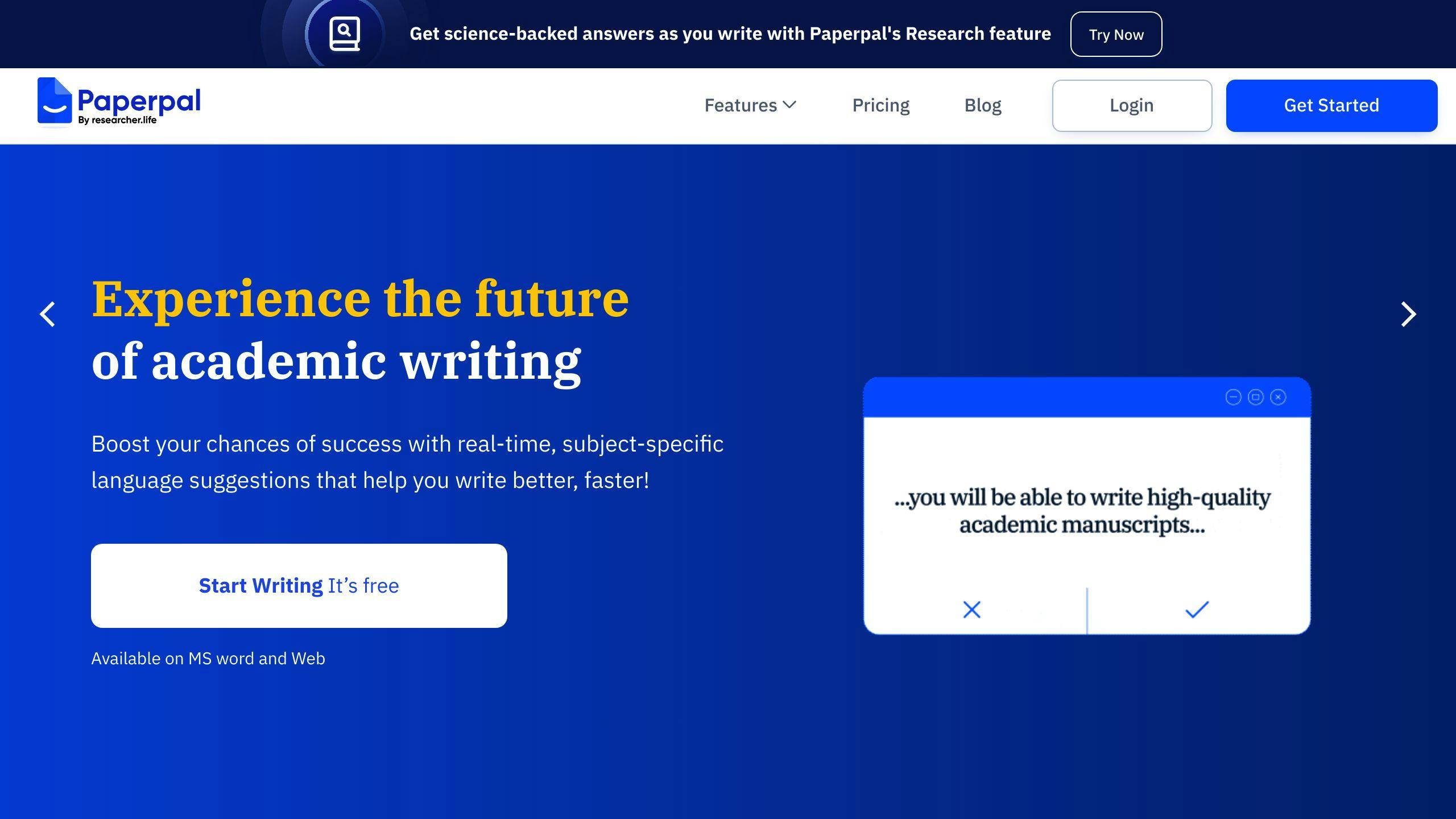![AI Consistency Checkers: 5 Tools Guide [2025]](/_next/image?url=https%3A%2F%2Fassets.seobotai.com%2Fyomu.ai%2F675f2ddafcc41ee685c9c8a1-1734290953039.jpg&w=3840&q=75)
AI Consistency Checkers: 5 Tools Guide [2025]
AI consistency checkers are transforming academic writing by helping researchers, students, and professionals create polished, uniform work. Here's what you need to know:
- These tools scan writing for style, format, and presentation issues
- They save time and improve readability of academic papers
- Key features include customizable style sheets and comprehensive scanning
Top 5 AI consistency checkers for 2025:
- Yomu AI: Autocompletes sentences and formats citations
- Trinka: Adjusts suggestions based on field of study
- ProWritingAid: Provides 20+ detailed writing reports
- Paperpal: Formats papers for different journals
- Grammarly: Offers real-time writing suggestions
Quick Comparison:
| Tool | Best For | Key Feature | Starting Price (Monthly) |
|---|---|---|---|
| Yomu AI | All academic writing | AI autocomplete | $19 |
| Trinka | Technical writing | Field-specific checks | $20 |
| ProWritingAid | Deep analysis | 20+ reports | $30 |
| Paperpal | Research formatting | Journal formatting | $25 |
| Grammarly | General writing | Real-time suggestions | $30 |
These tools fix common issues like spelling, punctuation, formatting, and citations. To get the most out of them:
- Choose a tool that matches your needs and budget
- Start with small writing pieces to get familiar
- Use the tool as a guide, not a replacement for your judgment
- Always do a final human review after using the tool
Remember: AI tools are helpers, not perfect solutions. Use them wisely to enhance your writing while maintaining your unique voice.
Related video from YouTube
5 Top Consistency Checking Tools
Let's check out five AI tools that'll help you nail your academic papers in 2025.
Yomu AI

Yomu AI isn't just another grammar checker. It's built for academic writing:
- It autocompletes your sentences based on context
- It formats your citations (goodbye, manual formatting!)
- It checks for plagiarism
- It you improve and refine your sentences, making them more concise and impactful
- It gives you detailed feedback on your writing
Yomu AI is all about academic integrity. It's not just fixing your grammar; it's boosting your paper's quality.
Trinka

Trinka knows academic writing inside out. Launched in 2018, it offers a range of features to help refine and polish your work. It adjusts its suggestions based on your field of study and prioritizes the security of your research data. Other features that Trinka supports include:
- It adjusts its suggestions based on your field of study
- It keeps your research data safe
- It offers advanced grammar and spelling checks
Trinka's premium plan costs $20 per user per month. There's also a free version if you want to try it out.
ProWritingAid

ProWritingAid is like a Swiss Army knife for writers, going beyond simple grammar checks to provide in-depth analysis and suggestions. It gives you over 20 detailed reports on your writing:
- It helps tighten up your academic style
- It makes sure your spelling and formatting are consistent
- It offers over 20 detailed reports on various aspects of writing, such as clarity, sentence structure, and overused words
- It suggests stronger vocabulary words to make your writing more impactful
It's a bit pricier at $30 per user per month, but it's worth it if you're serious about your writing.
Paperpal

If you're writing research papers, Paperpal's got your back:
- It formats your paper for different journals
- It helps with technical language
- It offers accurate, real-time academic translation for over 25 languages
- It offers features to overcome writer's block
It costs $25 a month which is on a pricier side, but it's a solid choice if you're aiming to publish.
Grammarly

Grammarly's the big name in writing tools, with over 30 million daily users:
- It gives you suggestions as you write
- It helps keep your tone academic
- It can offer synonyms and more impactful word choices to diversify language and strengthen writing
Grammarly's premium plan starts at $30 per month. It's not just for academic writing, but it's still a great all-rounder.
Here's a quick look at how these tools stack up:
| Tool | Best For | Cool Feature | Starting Price (Monthly) |
|---|---|---|---|
| Yomu AI | All academic writing | AI autocomplete | $19 |
| Trinka | Technical writing | Field-specific checks | $20 |
| ProWritingAid | Deep writing analysis | 20+ detailed reports | $30 |
| Paperpal | Research paper formatting | Journal formatting | $25 |
| Grammarly | General writing help | Real-time suggestions | $30 |
Each tool has its strengths. Pick the one that fits your needs, budget, and writing style. And remember, the best tool is the one you'll actually use to improve your writing.
Writing Issues These Tools Fix
AI consistency checkers are a big help for academic writers. They tackle common problems that can make or break your paper. Here's what these tools can do for you:
Spelling and Word Choice
Spelling mistakes and poor word choices can hurt your credibility. AI tools catch these errors:
- They flag confusing pairs like "affect" vs. "effect" or "i.e." vs. "e.g."
- Some tools suggest better word choices based on your field of study
"Even if these errors don't lead to rejection, they'll cause significant revisions. That's tedious and time-consuming." - Charlesworth Author Services
Punctuation and Format
Messy punctuation and formatting can distract readers:
- AI tools help with tricky comma rules that vary across English-speaking countries
- Some let you set up custom style guides to match specific formatting requirements
Some tools even flag inconsistencies in how you present tables, figures, and equation labels. This attention to detail can really polish your paper.
Numbers and Units
Consistency in numbers and measurements is key for clarity:
- Tools ensure you're using numbers consistently (e.g., "1, 2, 3" vs. "one, two, three")
- They flag inconsistencies in unit usage, helping you maintain a uniform approach
Citations and References
Proper citation is crucial for academic integrity. AI tools help here too:
- They format citations correctly, saving you hours of manual work
- Some scan your manuscript to ensure in-text citations match your reference list
By fixing these common issues, AI consistency checkers do more than just correct errors. They free you up to focus on what really matters - your ideas and research.
"With Paperpal, authors can focus on the important stuff and let the experts handle the details of academic writing consistency."
sbb-itb-1831901
Tool Features Compared
Let's break down the top AI consistency checkers for academic writing. Here's what you need to know:
Feature Comparison Chart
| Feature | Yomu AI | Grammarly | ProWritingAid | Trinka | Paperpal |
|---|---|---|---|---|---|
| AI-powered autocomplete | ✔️ | ❌ | ❌ | ❌ | ✔️ |
| Citation formatting | ✔️ | ❌ | ✔️ | ✔️ | ✔️ |
| Plagiarism checker | ✔️ | ✔️ | ✔️ | ✔️ | ✔️ |
| Real-time suggestions | ✔️ | ✔️ | ✔️ | ✔️ | ✔️ |
| Academic-specific checks | ✔️ | ❌ | ✔️ | ✔️ | ✔️ |
| Readability analysis | ✔️ | ✔️ | ✔️ | ✔️ | ✔️ |
Yomu AI's AI-powered autocomplete sets it apart for academic writing. ProWritingAid and Trinka offer more academic-specific checks than Grammarly, which is more general-purpose.
Cost Breakdown
Here's what you'll pay:
- Yomu: Free version available without AI; Paid plans start at $19/month
- Grammarly: Free version available; Premium from $30/month (annual billing)
- ProWritingAid: Free (500-word limit); Premium from $30/month
- Trinka: Free version available; Premium from $20/month
- Paperpal: Free plan available; Prime access from $25/month
Yomu AI stands out as a versatile and cost-effective tool for enhancing writing and language learning.
Use in Academic Work
Each tool has its strengths:
Yomu AI offers context-aware sentence completion and automated citation formatting. Big time-saver for researchers and students.
Grammarly isn't academic-specific, but it's great for general grammar and style checks.
ProWritingAid gives you over 20 detailed reports to refine your academic style and structure.
Trinka is built for academic and technical writing, with field-specific checks for specialized disciplines.
Paperpal focuses on improving manuscripts, perfect for researchers prepping papers for publication.
Success Rates
We don't have exact success rates for all tools, but here's what we know:
- Grammarly: 4.7/5 stars on G2 (8,400+ reviews)
- ProWritingAid: 4.5/5 stars (fewer reviews)
Trinka, Paperpal, and Yomu AI are more specialized for academic writing. They might catch more field-specific errors, but they have fewer public reviews.
Dr. Emily Chen, a Linguistics professor at Stanford, says: "AI tools like Grammarly catch about 60% of basic grammar errors. But academic-focused tools like Trinka have helped my students improve their technical writing accuracy by nearly 80%."
Bottom line: The best tool depends on your needs, writing style, and field. Try the free trials to see which one fits your workflow best.
How to Use These Tools
Let's dive into how to get the most out of AI consistency checkers. It's not rocket science, but a little know-how goes a long way.
How to Choose a Tool
Picking the right consistency checker can make or break your writing game. Here's what to keep in mind:
Match your needs to the tool. Writing a PhD thesis? Go for Trinka or Yomu AI. Cranking out blog posts? Grammarly might be your best bet.
Look at the features. If you're always messing up citations, pick a tool that's got your back in that department.
Take 'em for a test drive. Most tools offer free trials. Play around with a few and see which one clicks for you.
Watch your wallet. Prices range from free to "ouch, that's a lot." Find the sweet spot between features and what you're willing to shell out.
Getting Started
You've picked your tool. Now what?
Set up shop. Sign up and install any browser add-ons you need.
Make it yours. Tweak the settings to match your style. US or UK English? Formal or casual? You decide.
Start small. Don't dive into your magnum opus right away. Try a short piece first to get the hang of things.
Explore. Poke around and see what the tool can do. You might stumble on some hidden gems.
Tips for Better Results
Want to squeeze every drop of value out of your consistency checker?
Don't be a robot. Use the tool as a guide, not a crutch. Remember what the ProWritingAid folks say: "It's just a tool; it's not perfect."
Think before you click. Not every suggestion is gold. Use your noggin before accepting changes.
Practice makes perfect. The more you use it, the better you'll get at spotting issues on your own.
Two heads are better than one. AI is great, but it's not human. If you can, get a real person to look over your work too.
Mistakes to Avoid
Don't fall into these traps:
Autopilot mode. Don't let the tool do all the heavy lifting. Your unique voice matters.
Context is king. AI doesn't always get the nuances of your field. Trust your gut when it comes to specialized lingo.
The final once-over. Always give your work a last read after using the tool. You might catch something the AI missed.
Learn, don't just fix. Don't blindly accept suggestions. Use each one as a chance to level up your writing skills.
Summary
AI consistency checkers are changing the game for academic writing. They're not just tools - they're your new writing buddies. Here's the scoop:
These AI helpers are time-savers. They can cut your proofreading time in half, letting you focus on the good stuff - your ideas. And they're sharp. They catch way more mistakes than we do on our own, especially in tricky technical writing.
But here's the real kicker: they make your writing look polished. From spelling to citations, they keep everything in line, even in long papers.
For 2025, keep an eye on these top tools:
- Yomu AI: It's like having a writing coach for academics.
- Grammarly: The old reliable for grammar and style.
- ProWritingAid: Gives you the full lowdown on your writing.
- Trinka: Your go-to for academic and technical stuff.
- Paperpal: Gets your paper ready for the big leagues.
Now, don't get carried away. These tools are helpers, not miracle workers. Use them smart:
- Let them assist, but you do the thinking.
- Tweak the settings to fit your style and field.
- Always give your work a final once-over yourself.
Dr. Emily Chen from Stanford puts it nicely: "These AI tools are good at catching basic errors. But the real magic happens with academic-focused ones - they've helped my students boost their technical writing accuracy big time."
